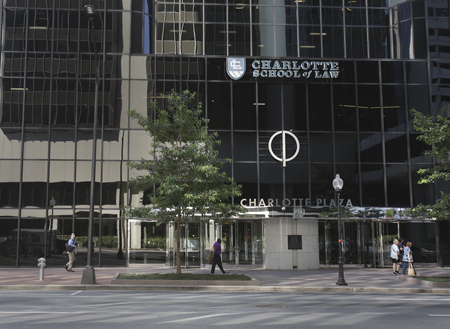InfiLaw investors let out of students' fraud lawsuit against Charlotte School of Law

The Charlotte School of Law. Photo by Albert Dickson.
Investors in the parent company of InfiLaw Corp. on Thursday won a motion to get out of a fraud lawsuit brought against Charlotte School of Law, which is owned by InfiLaw Corp.
The motion-to-dismiss order, which refers to defendants Sterling Capital Partners L.P. and Sterling Capital Partners GMBH & CO. KG as “Sterling Entities,” was granted by North Carolina U.S. District Judge Graham Mullen, Law360 (sub. req.) reports. Mullen found that the court has no jurisdiction over Sterling Entities.
The lawsuit, which seeks class action status, was brought by current and former Charlotte School of Law students in December, shortly after the law school was placed on probation by the ABA and the Department of Education pulled federal loan money for CSL students. Based on court records, three other lawsuits filed against Charlotte School of Law are pending in the U.S. District Court for the Western District of North Carolina, and all of them are assigned to Mullen.
“Plaintiffs make a feeble attempt in their opposition brief to tie the Sterling Defendants to their claims by vaguely citing their conduct related to the longterm financing and strategic goals of InfiLaw and the for-profit law school that it owned and operated in Charlotte, North Carolina,” Mullen notes in his order (PDF) for Krebs v. Charlotte School of Law (PDF). “Plaintiffs then, in a roundabout way, point to an allegation in the complaint that Sterling Entities were present at Charlotte School of Law after the Department of Education’s lack of recertification occurred as proof of sufficient connections.”
Those allegations are conclusory, Mullen wrote, and they don’t meet existing case law standards that Sterling Entities has any sort of control over Charlotte School of law beyond long-term financing.
A motion to dismiss InfiLaw as a defendant is pending. Filed in May, the motion (PDF) argues that the court lacks personal jurisdiction over InfiLaw, headquartered in Florida, and Don Lively, the former Charlotte School of Law president also named as a defendant. Lively now heads Arizona Summit Law School, another InfiLaw school.
The law school also faces a civil fraud investigation from the North Carolina attorney general’s office. In June the University of North Carolina’s Board of Governors committee, which handles state authorization and licensure for nonpublic, post-secondary degree-granting institutions, found that the law school was not in compliance with state standards regarding financial resources, planning or stability. As a condition of its state license, Charlotte School of Law must submit an ABA-approved teach out or remedial plan no later than Aug. 10.
In response, Charlotte School of Law released a statement (PDF) describing the UNC decision as “largely positive.” The statement claimed that it planned to continue pursuing participation in the federal loan program, and its ABA accreditation.



